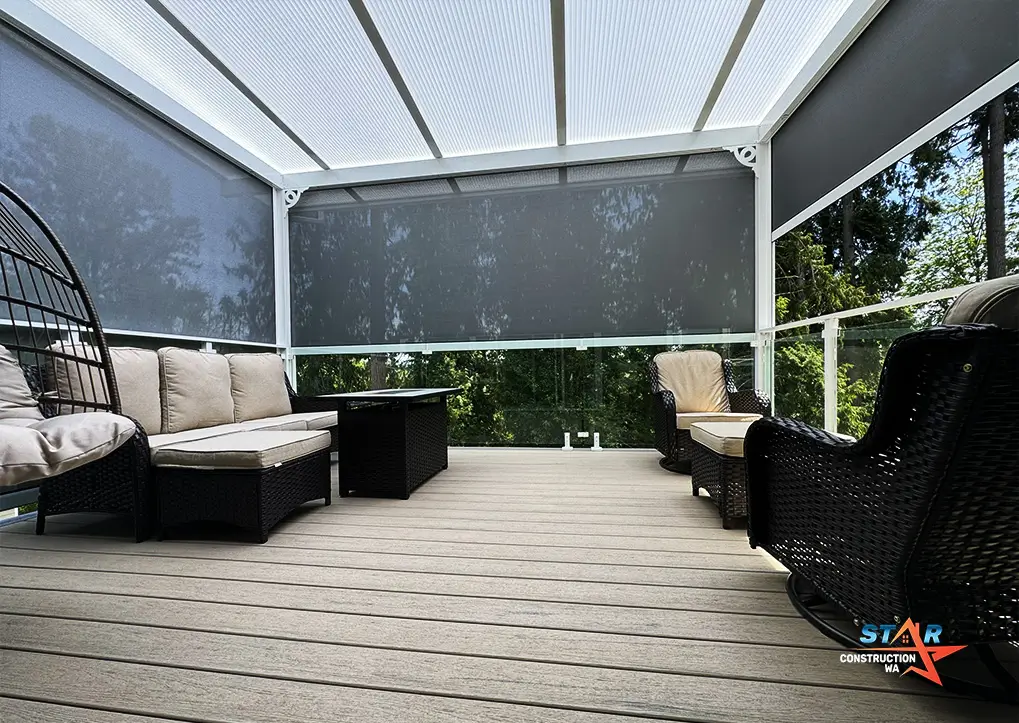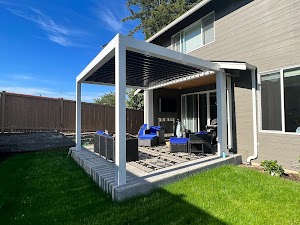Acrylic Patio Covers Seattle
Acrylic Patio Covers Seattle
Cost-Effective High Quality Acrylic Patio Covers

Acrylic Patio Covers for Your Roofing Needs
An Acrylic Roof is designed as a patio cover and a sunroom roof that will maintain high light transmission throughout the longevity of the product! Built Strong, it’s designed to offer protection from inclement weather and harmful UV rays, without blocking the natural light. Acrylic sheets are durable, 100% naturally UV stable and filter/soften harsh light. An Acrylic roof will retain 90% light transmission and clarity for about 30 years.
In addition to offering high quality, competitively priced acrylic patio covers in Seattle, Star Construction WA offers free installation quotes. Contact us today to schedule a consultation with one of our highly-trained and experienced specialists. We’ll be happy to discuss the details of your upcoming installation.
Also contact us to receive full details about our Motorized Louvered Roofs, Motorized Retractable Screens and Custom Decks.

Features & Benefits
- Superior energy savings and heat control
- Filters Harmful UV rays without blocking natural Light
- Highest light transmission
- Even light distribution
- Proven hail protection
- Patented condensate control
- Heaviest and most rigid panels
- Non-shattering safety glazing
- Integrated extruded aluminum gutter system
- Strong enough to hold fans, lights and plants
- Engineered to support heavy snowloads
- 30 year warranty against yellowing
Acrylic vs Polycarbonate Patio Covers
Both acrylic and polycarbonate are incredibly strong, stronger than glass and about ½ the weight. They can both be completely clear and are easy to clean. When you first look at these products, it can be hard to tell the difference between them, but under the surface there are several properties that set them apart.
Properties of Acrylic
Acrylic is sometimes called Plexiglass, but Plexiglass is just one of many brands of acrylic. This particular material has several benefits, including:
- More affordable than both glass and polycarbonate.
- Resists yellowing from the sun
- Better clarity than glass transmitting 92% of light
- Easier to machine and form
- Shiny material that can be polished to a smooth finish
- Has an impact resistance that is 17x that of glass
- Available in a range of colors
In addition, acrylic is a thermoplastic that is formed and bent using heat. It can have clean glue joints for an improved overall look because glue bonds well with it. If you are looking for an affordable alternative to glass that is significantly stronger, acrylic could be the right fit.
Acrylic does have some cons to consider when choosing a plastic material. When compared to polycarbonate, it is a more rigid material. It also is more prone to cracking when drilled and chips more easily.
Properties of Polycarbonate
Polycarbonate plastics have many similar properties to acrylic. Some of the key differences include:
- Higher cost, as much as 25% more expensive (depending on the grade)
- Significantly stronger, with 250x the impact resistance of glass and 30x the strength of acrylic
- Transmits 88% of light
- Working temperature of 240 degrees, giving it a low level of flammability
- Resists chips and cracking
- Corrosion resistant when used in chemical applications
- Will not crack even when the sheets are drilled in to
- Can be formed without heating
If you are in need of bullet resistant materials or materials to use in a highly caustic environment, such as in a plant that works with acidic or other potent chemicals, then polycarbonate is probably the right fit.
Like acrylic, polycarbonate has some cons to consider. It is typically not a shiny material, but it can be polished. Although it resists cracking and chipping, it dents and scratches easily. It has good clarity, but it is not UV resistant and unless coated it will yellow over time.







































